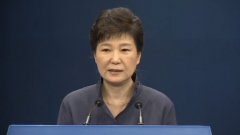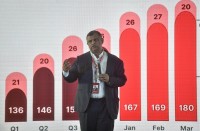
SEOUL, South Korea (Reuters) –South Korean President Park Geun-hye has been impeached by parliament over her role in an influence-peddling scandal linked to her friend Choi Soon-sil, and now awaits a Constitutional Court review of that decision.
The court has said it will conclude oral arguments on Monday (February 27). It has not said when a verdict will be delivered but, according to past practice, a decision could be reached after about two weeks.
If the impeachment is upheld, it would make Park the first democratically-elected South Korean leader to leave office in disgrace.
Park, 64, is accused of colluding with Choi to pressure big businesses including Samsung to make contributions to non-profit foundations backing presidential initiatives.
Park has denied wrongdoing but apologized for carelessness in her ties with Choi, a friend for four decades, who has also denied wrongdoing. Choi is in detention while on trial.
The scandal has drawn hundreds of thousands of protesters onto the streets of Seoul for weekly demonstrations demanding their president step down immediately.
A South Korean court has issued arrest warrants for two former presidential aides under investigation in the scandal.
Ahn Chong-bum faces charges of abuse of power and attempted extortion. Jeong Ho-seong was arrested on suspicion of leaking classified information.
Park’s powers have been suspended and Prime Minister Hwang Kyo-ahn took over as acting president after 234 of parliament’s 300 members voted to impeach her, meaning more than 60 members of her own party backed the motion against her.
In December 2016, the heads of nine of the biggest conglomerates, or chaebol, were subjected to an unprecedented 13-hour grilling by a parliamentary panel investigating the scandal. The nine groups have revenue of 910.5 trillion won ($780 billion), equivalent to more than half of South Korea’s GDP.
While no executives have been charged with wrongdoing, many have been questioned by investigators and the offices of the Samsung, Lotte and SK groups were raided.
A special prosecutor’s investigation into the scandal started in December 2016.
The chairman of the world’s third-largest pension fund, the National Pension Service (NPS), Moon Hyung-pyo, was arrested as special prosecutors have been looking into whether he pressured the pension fund to support the $8 billion merger last year of two Samsung Group affiliates.
Choi’s daughter Chung Yoo-ra, a 20-year-old equestrian competitor who trained in Germany, is also currently being held in Denmark after police there arrested her on January 2 in the northern city of Aalborg.
South Korean authorities have sought Chung for alleged criminal interference related to her academic record and other unspecified charges.
South Korean Culture Minister Cho Yoon-sun was summoned by special prosecutors on January 21 after she was arrested on suspicion of abuse of power for drawing up a blacklist of artists, writers and entertainers critical of the country’s impeached president, Park Geun-hye.
Jay Y. Lee, third-generation leader of Samsung Group and Samsung Electronics’ vice chairman, was arrested on Feb. 17 after being named a suspect by the South Korean special prosecutor’s office, which is expected to formally indict the 48-year-old executive soon.
The special prosecution accuses Lee of pledging 43 billion won in bribes, paid via Samsung Electronics and other group affiliates, to a company and foundations linked to Park’s confidant, Choi Soon-sil, to curry favour for a 2015 merger of affiliates and his succession to control of the conglomerate.
Samsung Group and Lee have denied paying bribes or seeking improper favors from the president. Lee, who is arguing that he was coerced into making the payments, told lawmakers during a December hearing that Samsung Group would take measures to avoid making improper payments in the future.







